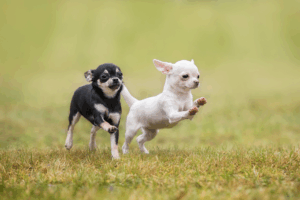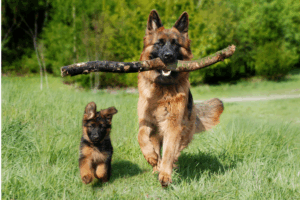
Chihuahua Lifespan: How Long Do They Live?
Highlights: The chihuahua is the smallest dog breed and has the longest lifespan. Caring for a chihuahua in their senior years requires extra attention to their eyes, teeth, and heart.
Published by

Highlights:
Dogs that eat poop, both their own and other animals, have a condition known as coprophagia.
This normal behavior is off-putting but only dangerous if your dog eats the feces of another animal contaminated with parasites.
Taking measures to help your dog avoid eating poop is key, along with adding supplements to support a long and healthy life.
Dogs practice some interesting behaviors. They lick themselves, bark at thin air, roll around in spots of grass that smell bad, and even drink toilet water. Of all the strange dog behaviors available, eating poop is one of the most perplexing.
It’s disgusting. It can’t taste good. It must be bad for them. Yet, dogs will routinely eat their own poop and the droppings of other animals. If you’ve noticed your dog is on poop patrol lately, you probably want to find a solution to deter the behavior, and fast.
Not only is a furry poop eater off-putting, but it doesn’t help with their breath and makes you less likely to want to them in your face giving you kisses. Together, we’ll explore whether poop eating is harmful, why dogs do it, and what you can do to help them break the habit.
Even though it seems like it would be downright toxic for your dog to eat their own poop, it isn’t. In fact, it’s pretty harmless.
Some animals, like rabbits and guinea pigs, require their own feces as part of their diets. Without it, they can develop digestive and health issues. Dogs do not need to consume their poo for survival or health but rarely does poop eating cause medical issues.
The problem with poop eating is when a dog begins eating the feces of other animals that could be infected with intestinal parasites. If your dog’s poop-eating habits include eating the feces of other animals in your home or other animals in the wild, there is a chance they could get sick and develop serious medical conditions like E. coli, salmonella, parvovirus, hookworms, roundworms, or whipworms.
DNA. Your dog is quite literally hard-wired to eat poop, as unpleasant as it sounds. One theory is that dogs have an inherent desire to protect their packs. When dogs were wild, the consumption of feces around the pack helped keep the pack safe from illness.
As such, eating poop is primarily considered a behavioral issue and is rarely associated with any underlying medical problems. So, rest assured that even if your dog’s diet has experienced an uptick in offal, there’s probably no nutritional deficiency or illness to blame.
Behavioral reasons why dogs begin and continue eating feces include the following. Keep in mind, however, that instinct and heredity play a major role in coprophagy.
Did you adopt your dog from a shelter? If so, they may have a poop-eating habit they developed while living in a small kennel. Dogs that live in small cages or kennels or are kept in isolation may eat their feces more than dogs who live with other animals or people every day.
If your dog continues to eat feces after you’ve brought them home, give them a few months to acclimate to living with you. Make sure you’re giving your pup plenty of attention to eliminate feelings of isolation.
Dogs can have anxiety just like humans. Although humans may resort to nail-biting or hair-pulling as not-so-great habits when they’re feeling overwhelmed, dogs may eat their own feces. When a dog eats its own poop, however, the reason could be that they are nervous about excessive punishment.
If you’ve been potty training your dog and using harsh methods of dog training, your dog may attempt to eat its poop if it has an accident inside and wants to eliminate the evidence. If this seems fitting, try using positive reinforcement as your primary tool for dog training and reward your dog when they remember to potty outside.
Don’t get offended if you make your dog’s food from scratch. A dog that associates food with feces isn’t associating the taste or smell but rather the proximity.
If your dog regularly poops near the same area where they are fed, they may simply associate the poop with food. To stop it, move your dog’s food dish away from their relief area and away from the cat’s litter box and defecation areas of other animals in your home.
Attention-seeking is one reason that dogs may eat their poop. Just like children, some dogs will perform inappropriate behavior to get the attention of their humans.
This doesn’t necessarily mean your dog is starved for attention, but it can mean that they need an extra walk or that you can offer your dog additional stimulation to thwart the problem. If you can’t fit in another walk or playtime, try offering your dog a chew toy or a treat dispenser that requires them to work to release the enclosed treat.
When mama dog cleans her puppies, they may smell feces on her breath and associate this with comfort and security. As such, when confronted with the same odor from their own poop or other animals, they may be drawn to it.
Mother dogs may also lick puppies to encourage them to eliminate and eat their puppies’ poop early in their lives. This can be a primary reason a puppy eats its own poop.
Although there can be many reasons dogs eat poop, most pet parents simply want actionable ways to discourage it.
Dog owners, there’s hope. If your dog is eating poop, there are a few techniques you can use to try to eliminate the habit.
Dogs may continue to eat their poop, but these tools may help reduce the frequency of poop-eating. In addition, you can take steps to support a long and healthy life through supplementation.
Longevity15 is the first and only supplement for dogs that includes pentadecanoic acid or C15:0. C15:0 is an odd-chain, saturated fatty acid. It’s also the first essential fatty acid discovered since the omegas over 90 years ago.
C15:0 supports your dog’s heart and liver function by targeting the foundation of your dog’s health: their cells. C15:0 deep dives into cells to keep them supported, which helps support your dog’s entire body.
C15:0:
The C15:0 in Longevity15 helps support your dog’s overwell wellness and is one of the smartest moves to help your dog live a longer life. Best of all, it comes without side effects and won’t ever give them any fishy breath. That means fresher breath and more close cuddles.
Your dog’s poop-eating habit isn’t necessarily dangerous, and for dogs, it is considered fairly normal. Take steps to reduce the habit and consider offering supplements to support a long and happy dog life.
Sources:
Why Does My Dog Eat Poop? | American Kennel Club
Dog Behavior Problems – Coprophagia | VCA Animal Hospitals
Relation between periodontal disease and systemic diseases in dogs | ScienceDirect

Highlights: The chihuahua is the smallest dog breed and has the longest lifespan. Caring for a chihuahua in their senior years requires extra attention to their eyes, teeth, and heart.

Highlights: German Shepherds are considered large breed dogs and have a life expectancy that is shorter than that of small breeds. Caring for a German Shepherd in their senior years
Have you ever seen a dog with an underbite, where the lower teeth stick out past the top teeth? Or maybe you’ve noticed a dog with an overbite, where the
Type anything...
We use cookies to provide you the best possible experience on our website. You consent to the usage of cookies by continuing to view our website. See our Privacy Notice for more information.